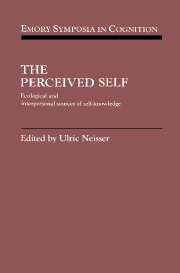Crossref Citations
This Book has been
cited by the following publications. This list is generated based on data provided by Crossref.
LONDON, MANUEL
and
SMITHER, JAMES W.
1995.
CAN MULTI‐SOURCE FEEDBACK CHANGE PERCEPTIONS OF GOAL ACCOMPLISHMENT, SELF‐EVALUATIONS, AND PERFORMANCE‐RELATED OUTCOMES? THEORY‐BASED APPLICATIONS AND DIRECTIONS FOR RESEARCH.
Personnel Psychology,
Vol. 48,
Issue. 4,
p.
803.
Mackay, Nigel
2003.
Psychotherapy and the Idea of Meaning.
Theory & Psychology,
Vol. 13,
Issue. 3,
p.
359.
Kihlstrom, JF
and
Klein, Stanley B
2006.
Encyclopedia of Cognitive Science.
Изотова, Елена
and
Гармаева, Татьяна
2008.
Взаимосвязь ценностных ориентаций и степени социализированности в юношеском возрасте.
Психологические исследования,
Vol. 1,
Issue. 1,
Asada, Minoru
2010.
Journal of the Robotics Society of Japan,
Vol. 28,
Issue. 4,
p.
386.
Brownell, Celia A.
Svetlova, Margarita
and
Nichols, Sara R.
2011.
Early Development of Body Representations.
p.
37.
Dobrez, Livio
2013.
The Perception of Depicted Motion.
Arts,
Vol. 2,
Issue. 4,
p.
383.
Dobrez, Patricia
2013.
The Case for Hand Stencils and Prints as Proprio-Performative.
Arts,
Vol. 2,
Issue. 4,
p.
273.
Bottenberg, Frances
2013.
The Self and Its Emotions.
Philosophical Psychology,
Vol. 26,
Issue. 3,
p.
480.
Reyer, Maren
Fina, Stefan
Siedentop, Stefan
and
Schlicht, Wolfgang
2014.
Walkability is Only Part of the Story: Walking for Transportation in Stuttgart, Germany.
International Journal of Environmental Research and Public Health,
Vol. 11,
Issue. 6,
p.
5849.
Dobrez, Patricia
2014.
Hand Traces: Technical Aspects of Positive and Negative Hand-Marking in Rock Art.
Arts,
Vol. 3,
Issue. 4,
p.
367.
Asada, Minoru
2014.
Towards Artificial Empathy based on Affective Developmental Robotics.
Journal of the Robotics Society of Japan,
Vol. 32,
Issue. 8,
p.
666.
Asada, Minoru
2015.
Towards Artificial Empathy.
International Journal of Social Robotics,
Vol. 7,
Issue. 1,
p.
19.
Zheng, Wei
and
Muir, Douglas
2015.
Embracing leadership: a multi-faceted model of leader identity development.
Leadership & Organization Development Journal,
Vol. 36,
Issue. 6,
p.
630.
Périer, Antoine
2016.
Se risquer à deux. de l’escalade comme vecteur thérapeutique et comme médiation à l’adolescence.
La psychiatrie de l'enfant,
Vol. Vol. 59,
Issue. 1,
p.
145.
Sahli, Fatima Zahra
2019.
Les graffiti au service de la sécurité routière au Maroc : Esquisse d’une approche psychosociale.
Insaniyat / إنسانيات,
p.
59.
Asada, Minoru
2020.
Rethinking Autonomy of Humans and Robots.
Journal of Artificial Intelligence and Consciousness,
Vol. 07,
Issue. 02,
p.
141.
Jansom, Akawut
and
Pongsakornrungsilp, Siwarit
2021.
How Instagram Influencers Affect the Value Perception of Thai Millennial Followers and Purchasing Intention of Luxury Fashion for Sustainable Marketing.
Sustainability,
Vol. 13,
Issue. 15,
p.
8572.
Giallini, Ilaria
Nicastri, Maria
Mariani, Laura
Turchetta, Rosaria
Ruoppolo, Giovanni
de Vincentiis, Marco
Vito, Corrado De
Sciurti, Antonio
Baccolini, Valentina
and
Mancini, Patrizia
2021.
Benefits of Parent Training in the Rehabilitation of Deaf or Hard of Hearing Children of Hearing Parents: A Systematic Review.
Audiology Research,
Vol. 11,
Issue. 4,
p.
653.
Chen, Charles P.
and
Mastragostino, Emily
2023.
Counselling approaches to support former gang members in constructing new careers.
British Journal of Guidance & Counselling,
Vol. 51,
Issue. 5,
p.
781.



